七年级下册U5-U7各个话题知识要点
- 格式:doc
- 大小:56.50 KB
- 文档页数:8
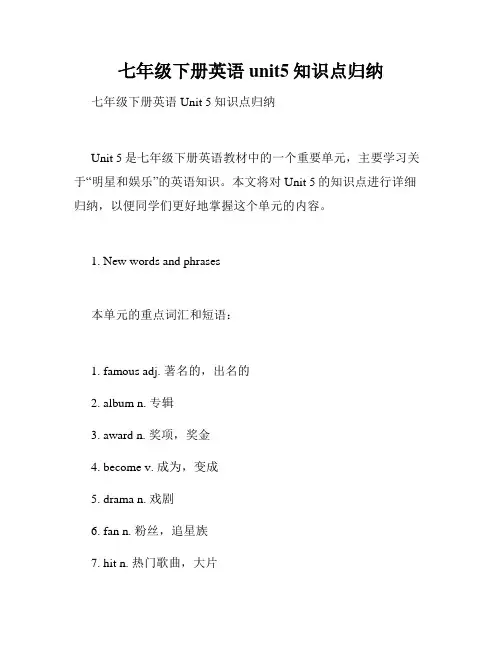
七年级下册英语unit5知识点归纳七年级下册英语Unit 5知识点归纳Unit 5是七年级下册英语教材中的一个重要单元,主要学习关于“明星和娱乐”的英语知识。
本文将对Unit 5的知识点进行详细归纳,以便同学们更好地掌握这个单元的内容。
1. New words and phrases本单元的重点词汇和短语:1. famous adj. 著名的,出名的2. album n. 专辑3. award n. 奖项,奖金4. become v. 成为,变成5. drama n. 戏剧6. fan n. 粉丝,追星族7. hit n. 热门歌曲,大片8. magazine n. 杂志9. movie n. 电影10. performance n. 演出,表演11. popular adj. 受欢迎的,流行的12. singer n. 歌手13. talent n. 天赋,天才14. TV show n. 电视节目2. Grammar本单元的语法重点:1. Be动词的用法:am/is/are例如:I am a fan of Justin Bieber.He is a famous singer.We are going to watch a movie tonight.2. 一般现在时的第三人称单数形式:一般情况下,一般现在时的动词加s,但是词尾是s、x、sh、ch结尾的动词要加-es。
例如:She loves to watch TV shows.My brother listens to pop music.Tom watches a lot of drama on TV.3. 物主代词的用法:我的 + 名词:my 名词你的 + 名词:your 名词他的 + 名词:his 名词她的 + 名词:her 名词我们的 + 名词:our 名词你们的 + 名词:your 名词他们的 + 名词:their 名词例如:This is my album.That is her TV show.Their performance was amazing.3. Sentence patterns本单元的句型重点:1. I am a fan of...例如:I am a fan of Justin Bieber.I am a fan of superhero movies.2. He/She is a famous...例如:She is a famous singer.He is a famous actor.3. He/She became famous because...例如:He became famous because he won an award.She became famous because she starred in a hit movie.4. Do you like...?例如:Do you like pop songs?Do you like to watch TV shows?4. Listening and speaking本单元的听说重点:1. 用英语发表关于自己最喜欢的歌手、电影或电视节目的简短演讲。
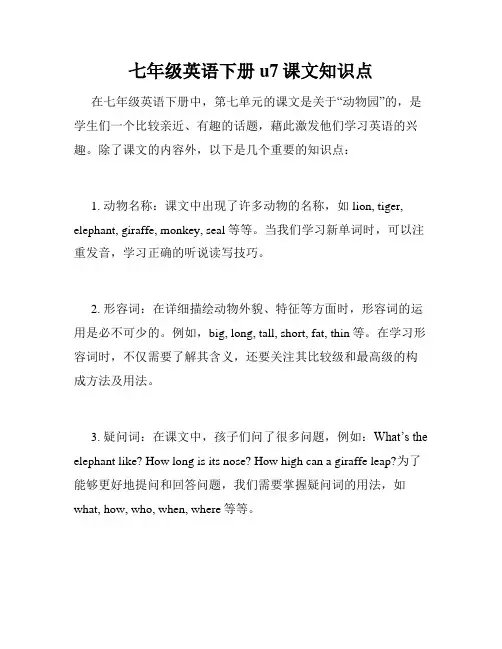
七年级英语下册u7课文知识点在七年级英语下册中,第七单元的课文是关于“动物园”的,是学生们一个比较亲近、有趣的话题,藉此激发他们学习英语的兴趣。
除了课文的内容外,以下是几个重要的知识点:1. 动物名称:课文中出现了许多动物的名称,如lion, tiger, elephant, giraffe, monkey, seal等等。
当我们学习新单词时,可以注重发音,学习正确的听说读写技巧。
2. 形容词:在详细描绘动物外貌、特征等方面时,形容词的运用是必不可少的。
例如,big, long, tall, short, fat, thin等。
在学习形容词时,不仅需要了解其含义,还要关注其比较级和最高级的构成方法及用法。
3. 疑问词:在课文中,孩子们问了很多问题,例如:What’s the elephant like? How long is its nose? How high can a giraffe leap?为了能够更好地提问和回答问题,我们需要掌握疑问词的用法,如what, how, who, when, where等等。
4. 四会词汇:作为英语学习的基础,四会词汇的掌握是必须的。
在本单元中,孩子们需要掌握的四会词汇包括animal, lion, tiger, elephant, giraffe, monkey, seal, interesting, nose, try等等。
此外,在课文学习的过程中,学生还需要注意细节和思辨问题,例如:1. 动物园中的动物是怎样被照顾和保护的?2. 人们到动物园去的目的是什么?3. 你去了动物园,最喜欢什么动物?为什么?总之,通过本单元的学习,学生们可以了解到更多有关动物以及动物园的知识,也可以锻炼自己的听、说、读、写和思维能力,是一节非常富有收获的英语课。
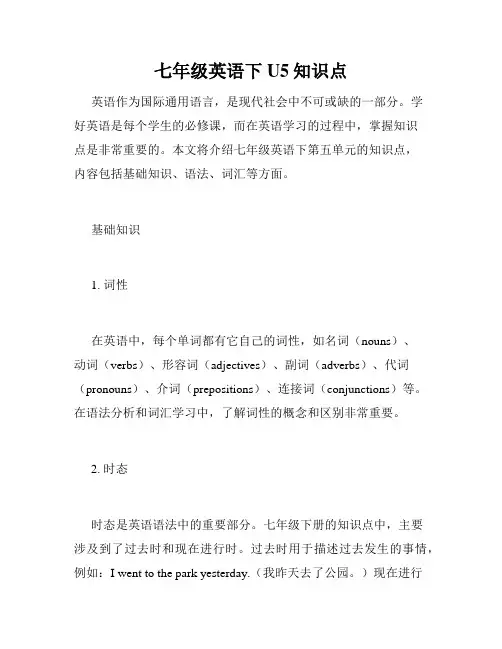
七年级英语下U5知识点英语作为国际通用语言,是现代社会中不可或缺的一部分。
学好英语是每个学生的必修课,而在英语学习的过程中,掌握知识点是非常重要的。
本文将介绍七年级英语下第五单元的知识点,内容包括基础知识、语法、词汇等方面。
基础知识1. 词性在英语中,每个单词都有它自己的词性,如名词(nouns)、动词(verbs)、形容词(adjectives)、副词(adverbs)、代词(pronouns)、介词(prepositions)、连接词(conjunctions)等。
在语法分析和词汇学习中,了解词性的概念和区别非常重要。
2. 时态时态是英语语法中的重要部分。
七年级下册的知识点中,主要涉及到了过去时和现在进行时。
过去时用于描述过去发生的事情,例如:I went to the park yesterday.(我昨天去了公园。
)现在进行时则用于描述现在正在发生的事情,例如:I am studying English now.(我现在正在学英语。
)掌握不同的时态,可以更好地理解和表达英语的意思。
语法1.陈述句和疑问句陈述句和疑问句是英语语法中的两种基本句型。
陈述句用于陈述某种事实,例如:I have a dog.(我有一只狗。
)疑问句则是用于问问题,例如:Do you have a dog?(你有一只狗吗?)在句型结构和词语选择上,两者有所不同。
2.情态动词情态动词是英语语法中的一类特殊动词,包括 can、could、may、might、must、shall、should、will、would 等。
它们具有独特的语意功能,在表达能力、推测、义务、建议等方面起到了重要的作用。
例如:You should study harder.(你应该更加努力学习。
)在语法分析和语言表达中,掌握情态动词的用法非常重要。
词汇1. 日常用语在英语的生活交流中,常用的日常用语涉及到问候、感谢、道歉、请求等方面。
例如:Hello.(你好。
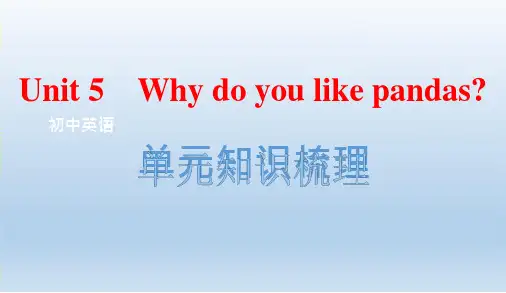
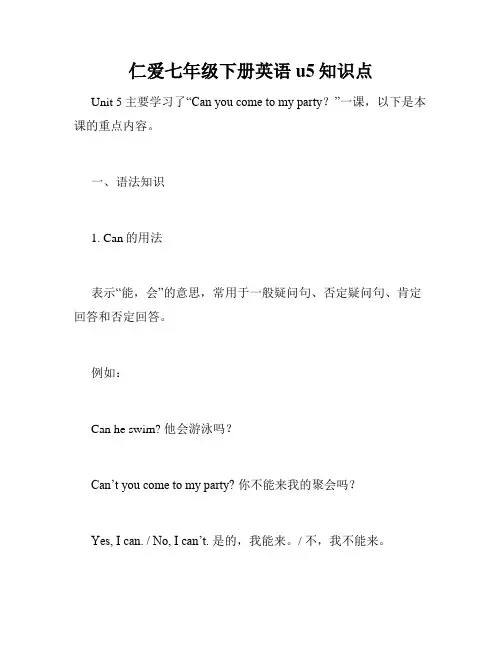
仁爱七年级下册英语u5知识点Unit 5主要学习了“Can you come to my party?”一课,以下是本课的重点内容。
一、语法知识1. Can的用法表示“能,会”的意思,常用于一般疑问句、否定疑问句、肯定回答和否定回答。
例如:Can he swim? 他会游泳吗?Can’t you come to my party? 你不能来我的聚会吗?Yes, I can. / No, I can’t. 是的,我能来。
/ 不,我不能来。
2. 反意疑问句反意疑问句的结构为主句,助动词+not+主语,疑问句用肯定或否定形式。
例如:You can come to my party, can’t you? 你能来我的聚会,对吗?3. 疑问词的用法疑问词常见的有what, when, where, who, why, how等,用于提问。
例如:What time is the party? 聚会什么时候举行?When are you leaving for the party? 你什么时候去参加聚会?4. 一般将来时一般将来时表示将来会发生的动作或存在的状态,常用will / won’t + 动词原形。
例如:I will go to the party. 我会去参加聚会。
She won’t come to the party. 她不会来参加聚会。
二、词汇知识1. party 聚会2. invitation 邀请3. present 礼物4. celebrate 庆祝5. birthday 生日6. holiday 假期7. weekend 周末8. vacation 假期三、阅读技巧1. 阅读全文首先阅读全文,捕捉重点信息,确定文章主题。
2. 理解重要段落找出文章中的关键段落,理解段落中的细节、事实和人物。
3. 抓住关键词抓住文章中的关键词,可涉及具体情节、人物、时间和地点等。
四、听力技巧1. 提前预测在听力开始前,可以预测听到的主题和话题,加深对话题的理解。
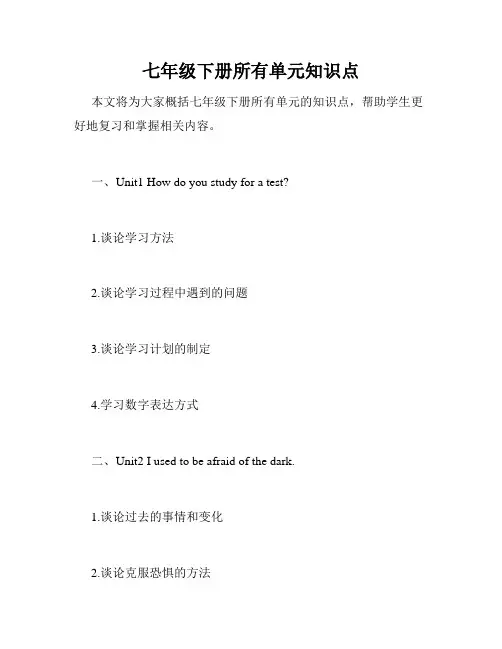
七年级下册所有单元知识点本文将为大家概括七年级下册所有单元的知识点,帮助学生更好地复习和掌握相关内容。
一、Unit1 How do you study for a test?1.谈论学习方法2.谈论学习过程中遇到的问题3.谈论学习计划的制定4.学习数字表达方式二、Unit2 I used to be afraid of the dark.1.谈论过去的事情和变化2.谈论克服恐惧的方法3.学习各种形式过去时态三、Unit3 Teenagers should be allowed to choose their own clothes.1.谈论青少年的衣着2.谈论学校的校服政策3.谈论文化差异4.谈论如何控制情绪四、Unit4 What would you do?1.学习各种形式的虚拟语气2.谈论可能发生的情况3.谈论解决问题的方法五、Unit5 What are the shirts made of?1.学习各种纤维的特点2.学习制作衣服的方法和流程3.谈论如何选择合适的服装六、Unit6 I’m more outgoing than my sister.1.谈论性格特点2.学习比较级和最高级3.谈论家庭关系七、Unit7 The birthday party invitation.1.学习如何书写和发送邀请函2.学习聚会礼仪3.谈论聚会的准备工作八、Unit8 I’ll help clean up the city parks.1.谈论城市环境问题2.学习如何保护环境3.谈论公民责任九、Unit9 What does he look like?1.学习外貌描述2.学习询问他人外貌的方式3.谈论自我形象十、Unit10 By the time I got outside, the bus had already left.1.学习过去完成时2.谈论旅行经历3.学习如何写日记和游记以上是七年级下册所有单元的知识点,希望本文能够对大家的学习有所帮助。
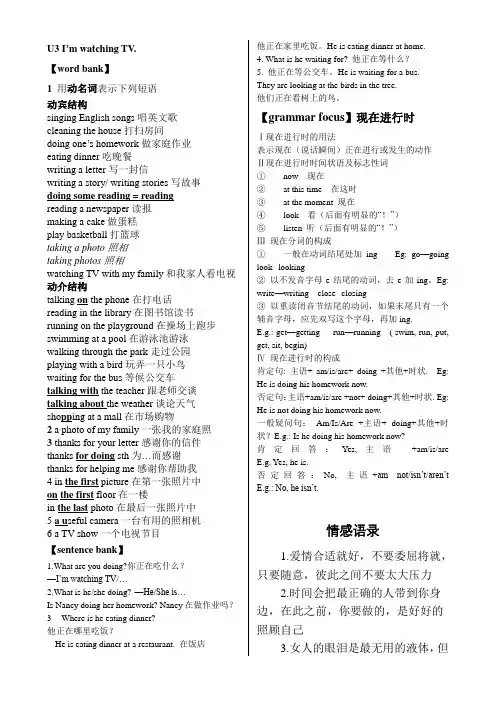
U3 I’m watching TV.【word bank】1用动名词表示下列短语动宾结构singing English songs唱英文歌cleaning the house打扫房间doing one’s homework做家庭作业eating dinner吃晚餐writing a letter写一封信writing a story/ writing stories写故事doing some reading = readingreading a newspaper读报making a cake做蛋糕play basketball打篮球taking a photo照相taking photos照相watching TV with my family和我家人看电视动介结构talking on the phone在打电话reading in the library在图书馆读书running on the playground在操场上跑步swimming at a pool在游泳池游泳walking through the park走过公园playing with a bird玩弄一只小鸟waiting for the bus等候公交车talking with the teacher跟老师交谈talking about the weather谈论天气sho pp ing at a mall在市场购物2 a photo of my family一张我的家庭照3 thanks for your letter感谢你的信件thanks for doing sth为…而感谢thanks for helping me感谢你帮助我4 in the first picture在第一张照片中on the first floor在一楼in the last photo在最后一张照片中5 a u seful camera一台有用的照相机6 a TV show一个电视节目【sentence bank】1.What are you doing?你正在吃什么?—I’m watching TV/…2.What is he/she doing? —He/She is…Is Nancy doing her homework? Nancy在做作业吗?3 -- Where is he eating dinner?他正在哪里吃饭?-- He is eating dinner at a restaurant. 在饭店他正在家里吃饭。
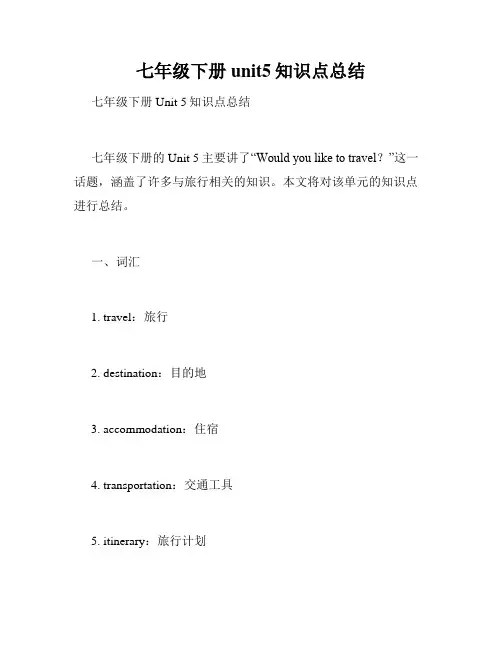
七年级下册unit5知识点总结七年级下册Unit 5知识点总结七年级下册的Unit 5主要讲了“Would you like to travel?”这一话题,涵盖了许多与旅行相关的知识。
本文将对该单元的知识点进行总结。
一、词汇1. travel:旅行2. destination:目的地3. accommodation:住宿4. transportation:交通工具5. itinerary:旅行计划6. souvenir:纪念品7. guidebook:旅游指南8. language:语言二、句型1. Would you like to travel to...?“Would you like to...?”是询问对方是否想要做某事的常用句型,用来询问对方是否对某个旅行目的地感兴趣。
例如:Would you like to travel to Japan?2. Yes, I’d love to.“Yes, I’d love to.” 是肯定对方提议的常用回答,表示愿意去。
例如:A: Would you like to go to the beach this weekend?B: Yes, I’d love to.3. How long are you staying?“How long are you staying?”用来询问对方在某个地方待多久。
例如:A: How long are you staying in Shanghai?B: I’m staying for three days.4. What’s your itinerary?“What’s your itinerary?”用来询问对方的旅行计划。
例如:A: What’s your itinerary for your trip to Paris?B: I’m going to visit the Eiffel Tower and the Louvre Museum.5. What’s the best way to get to...?“What’s the best way to get to...?”用来询问前往某个地方的最佳交通方式。
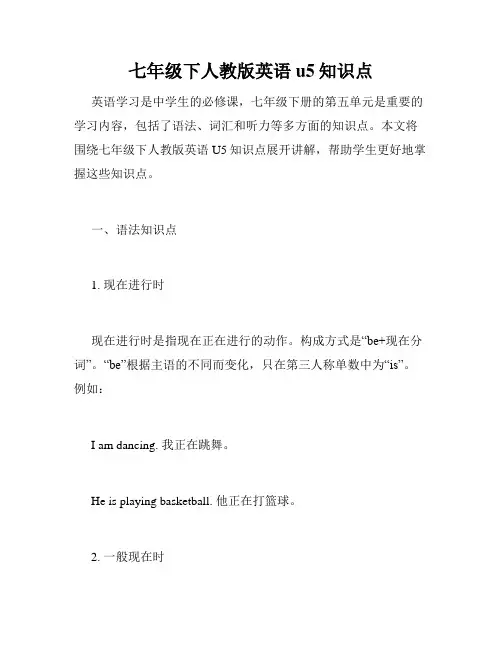
七年级下人教版英语u5知识点英语学习是中学生的必修课,七年级下册的第五单元是重要的学习内容,包括了语法、词汇和听力等多方面的知识点。
本文将围绕七年级下人教版英语U5知识点展开讲解,帮助学生更好地掌握这些知识点。
一、语法知识点1. 现在进行时现在进行时是指现在正在进行的动作。
构成方式是“be+现在分词”。
“be”根据主语的不同而变化,只在第三人称单数中为“is”。
例如:I am dancing. 我正在跳舞。
He is playing basketball. 他正在打篮球。
2. 一般现在时一般现在时是指现在经常性或普遍性的动作或状态。
构成方式是动词原形或第三人称单数形式。
例如:I like ice cream. 我喜欢冰淇淋。
My mother washes vegetables every day. 我妈妈每天洗蔬菜。
3. 过去式过去式是指已经发生了的动作或状态。
大多数动词的过去式是在词尾加-ed。
如果动词是以e结尾,只加d。
如果动词是以辅音字母+y结尾,变y为i再加ed。
例如:I played basketball yesterday. 我昨天打了篮球。
He watched TV last night. 他昨晚看了电视。
二、词汇知识点1. 衣服类词汇shirt n.衬衫pants n.裤子shorts n.短裤socks n.袜子shoes n.鞋子2. 家庭成员类词汇father n.父亲mother n.母亲grandfather n.祖父grandmother n.祖母sister n.姐妹brother n.兄弟三、听力知识点1. 语音语调英语的语音和语调是学习者需要注意的重点,正确掌握这些内容有助于提高听力和口语表达能力。
2. 听取细节信息在听力练习中,学生需要注意听取细节信息,例如具体时间、地点、人物等,以便更好地理解所听内容。
3. 相关词汇积累在听力过程中,如果遇到不认识的词汇,学生应该牢记下来并尝试查阅相关字典或资料,以便在以后的学习中逐渐积累。
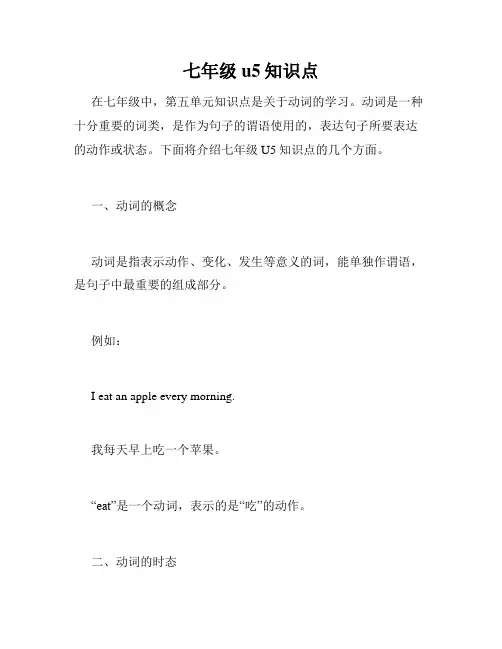
七年级u5知识点在七年级中,第五单元知识点是关于动词的学习。
动词是一种十分重要的词类,是作为句子的谓语使用的,表达句子所要表达的动作或状态。
下面将介绍七年级U5知识点的几个方面。
一、动词的概念动词是指表示动作、变化、发生等意义的词,能单独作谓语,是句子中最重要的组成部分。
例如:I eat an apple every morning.我每天早上吃一个苹果。
“eat”是一个动词,表示的是“吃”的动作。
二、动词的时态动词的时态是指表示动作、状态发生的时间的变化形式,主要分为一般现在时、一般过去时和一般将来时。
一般现在时:表示现在正在进行的动作或现在的状态。
例如:I usually go to bed at ten o'clock.我通常在10点钟睡觉。
一般过去时:表示过去发生的动作或状态。
例如:Yesterday, I went to the park with my friends.昨天,我和我的朋友们去了公园。
一般将来时:表示将来的动作或状态。
例如:I will study hard and become a doctor in the future.我将来会努力学习,成为一名医生。
三、动词的语态动词的语态是指表示主语与谓语间关系的不同形式,主要分为主动语态和被动语态。
主动语态:表示句子的主语做主动的动作。
例如:She writes a letter to her friend.她写了一封信给她的朋友。
被动语态:表示句子的主语是被动的,受到动作的影响。
例如:The letter was written by her.这封信是她写的。
四、动词的形式动词的形式包括基本形式、第三人称单数形式、过去式和过去分词形式。
基本形式:是动词的最原始形态,通常是不带任何时态和语态的。
例如:She can swim well.她游泳游得很好。
第三人称单数形式:是指当主语为第三人称单数时动词变化的形式。
例如:My father always reads the newspaper after dinner.我父亲总是在晚饭后看报纸。
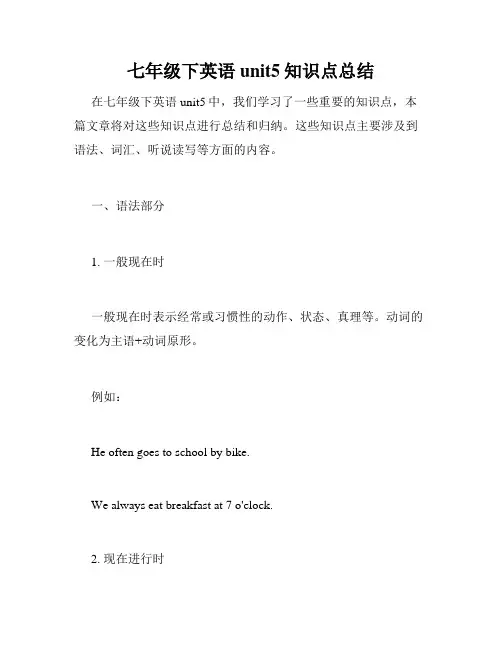
七年级下英语unit5知识点总结在七年级下英语unit5中,我们学习了一些重要的知识点,本篇文章将对这些知识点进行总结和归纳。
这些知识点主要涉及到语法、词汇、听说读写等方面的内容。
一、语法部分1. 一般现在时一般现在时表示经常或习惯性的动作、状态、真理等。
动词的变化为主语+动词原形。
例如:He often goes to school by bike.We always eat breakfast at 7 o'clock.2. 现在进行时现在进行时表示现在正在进行的动作。
动词的变化为主语+am/is/are+动词+ing。
例如:She is watching TV now.They are studying English at school.3. 形容词比较级和最高级形容词比较级和最高级分别表示两个或多个事物的比较和三个或三个以上事物的比较。
比较级的变化为形容词+er,最高级的变化为形容词+est。
例如:This book is more interesting than that one.Alice is the tallest girl in our class.二、词汇部分1. 动物本单元中,我们学习了一些动物的名称,如tiger(老虎)、panda(熊猫)、elephant(大象)等。
2. 食物本单元中,我们学习了一些食物的名称,如hamburger(汉堡包)、pizza(比萨饼)、hot dog(热狗)等。
3. 数字本单元中,我们学习了1-100之间的数字,并学习了如何表达时间和日期。
三、听说读写部分1. 听力在本单元中,我们进行了多次听力练习,包括听录音选单词、听录音选择应答语、听录音填空等。
这些练习有助于提高我们的听力理解能力。
2. 口语在本单元中,我们学习了如何用英语表达自己的观点、感受和交流。
我们进行了口语练习,如问答练习、角色扮演等,这些练习有助于提高我们的口语表达能力。
7下U5知识点 Unit 5 Why do you like pandas? 课文重难点讲解 单元话题:动物园里的动物 单元语法:Why, What, Where 问句;关于品质的形容词 Section A 1. Why do you like pandas? 你为什么喜欢熊猫呢? P25t 【解析】Why 特殊疑问副词,“为什么”,用来询问原因。 Why 引导的特殊疑问句用because 来回答。 ①—Why do you want to see the lions? — Because they are cute. ②—Why does she like pandas? —Because they are cute. 2. Let’s see the pandas first. 咱们先看熊猫吧。P25t 【解析】let’s=let us “让我们…吧。” 后接动词原形。用来提建议【结构】:Let’s do sth 让我们一起做某事 【回答时用】:OK/All right/Yes, let’s… 【拓展】:let sb. do sth 让某人做某事 Our teacher let us stay here. 3. Why do you want to see them?你为什么想去看它们?P25b 【解析】want v 想要,后接名词和不定式做宾语 want sth 想要某物 I want a pen. want to do sth 想要做某事 Do you want to see the tiger? want sb. to do sth 想要某人做某事 My mom wants me to work hard. 4. — Why do you want to see them?你为什么想看它们呢?P25b —Because they’re interesting.因为它们有趣。 【解析】interesting adj. 有趣的 interested 感兴趣的 be interested in 对...感兴趣 The story is interesting so I am interested in it. 5. Where are they from? 它们来自哪里? P26m 【解析】be from =come from 来自 She is from France.=She comes from France. be from 构成否定句时,在be 后加not;构成疑问句时,将be 提前。come from 构成否定句或疑问句时,要借助助动词do或does. ①Her pen pal is from China. =Her pen pal comes from China. (2) My classmate is not from China. =My classmate doesn’t come from China. 6. Well, because she’s kind of boring.奥,因为它有点儿无趣。P26b 【解析】kind of=a little/a bit “有几分“ 修饰形容词 The pandas are kind of cute. a kind of一种 all kinds of 各种各样的 different kinds of不同种类的 ①— Why do you like dolphins? —Because they are kind of interesting. ②There are all kinds of animals in the park. ③ A giraffe is a kind of animal. 长颈鹿是一种动物。 单元语法专讲 1)不定冠词a/an的用法: 1).a,an区别有一条,不看字母看音标。 2).a 用在辅音音素开头的单词前,an 用在元音音素开头的单词前 a book ,a pen ,a rule an orange/apple/hour/elephant. an English boy 一个英国男孩 练习:选择“A. a B. an C .the . D. /” 完成下列各题。 1. Look! There is _______elephant in the zoo. 2. Can you speak_________ French, Julia? 3. What time do you usually eat _____lunch. 4. There is ___giraffe over there, and there is___ koala next to___ giraffe. 5. I often listen to ______music, and I can play _____violin. 6. Do you like______ dolphins? 7.We can see _____lots of cute animals in the Zoo. 8.Mr Green and his son usually take ____walk through the park in the afternoon. 9.–Do you often play sports in ______morning? --No. But I play sports at_ _____ night. 10.Mr Zhang has ____old friend ,and he often goes to visit ________old friend on weekends. 2)形容词的用法: 1).作定语,放在名词之前。 a beautiful flowers 漂亮的花 2).形容词作表语,放在系动词之后。 They are cute. 本单元的主要形容词: cute 可爱的 interesting 有趣的 fun 逗人的 smart 聪明的 scary 可怕的 shy 害羞的 quiet 安静的 friendly 友好的 3)特殊疑问句 1).定义:特殊疑问句是由特殊疑问词(what, who ,when, where, why, how)引导的疑问句。 2).构成:特殊疑问词+一般疑问句 3).注意:特殊疑问句要求针对情况具体回答,不可以用Yes/No 做简略回答。 4).特殊疑问词的选用: (1)who---对“人”进行提问,意为“谁” (2)what---对“什么”进行回答 (3)why ---对原因进行提问 (4)where ---对地点进行提问 (5)when ---对时间进行提问 (6)what time ---对具体的钟点提问 (7)how ---对方式/程度提问 (8)how old ---对年龄提问 (9)how many ---对可数名词的数量提问 (10)how much---对价格或不可数名词的数量提问 Section A Exercise: I. 用所给词的正确形式填空 1.Let me __________(help) you. 2.There__________(be) some broccoli on the desk. 3.Mike __________(not have) a computer. 4.They have fun__________(learn) English. 5. Let’s __________________(see) the pandas. II.单项选择 ( )1 —___do you like the dogs? —Because they are very friendly. A. Who B. What C. Where D. Why ( )2.People like _____animals because they’re ___cut e. A. kind of kind of B. kind of this kind of C. this kind of; kind of D. this kind of this kind of ( )3.—Is that ____elephant?—No ,it’s ____lion. A .an, a B. a, an C. an, an D. a, a ( )4.—_____do you like animals? —____they are cute. A. Why, Because B. What, So C. Why, So D. What, Because ( )5.—Let’s go for a walk. — _______ A. OK. Let’s go B. Why? C. Let’s go home D. No, we don’ ( ) 6. —Let’s go swimming this afternoon. — ______. A. Excuse me B. Good idea C. You’re welcome D. That’s all right ( )7. —_____ do you like tigers? — Because they are cool. A. What B. Why C. How D. Which ( )8. The tigers are _____ interesting. A. kind of B. a kind of C. a kind D. kind ( )9. When I walked past the park , I saw a girl _____ the guitar there. A. play B. plays C. playing D. played ( ) 10. We need to have _____ patience to finish the work. A. a lot B. a lot of C. lots of D. B& C
七年级英语下册Unit5知识点七年级英语下册Unit5知识点Unit 5 Our School Life Topic1 一、重点词语: 1. wake up 醒来,唤醒 get up 起床 2. go to school 去上学 go home 回家 3. go dancing / shopping / skating / swimming 去跳舞;购物、滑冰;游泳 go doing something 可用于表达去进行某种娱乐休闲活动。
4. 表示交通方式: on foot 步行 by boat 坐船 by ship 坐船 by air 乘飞机 by plane 乘飞机 by train 坐火车 by subway 搭乘地铁 by car 坐小汽车 by bus 坐公共汽车 by bike 骑自行车 5. take the subway / bus / car 搭乘地铁;公共汽车;小汽车 6. drive a car to work = go to work by car 驾车去上班 take a bus to work = go to work by bus 乘公共汽车去上班 go to school on foot = walk to school 步行去上学 7. ride a bike / horse 骑自行车;骑马 8. after school / class 放学以后;下课以后 9. play the piano / guitar / violin 弹钢琴;吉他;小提琴 play basketball / soccer / football 打篮球;踢足球;打橄榄球 play computer games 玩电脑游戏 play with a computer 玩电脑 play sports 做运动 10. next to 紧挨着,在…旁边 11. a plan of my school 一幅我们学校的平面图 12. on weekdays 在工作日 at weekends 在周末 13. have breakfast / lunch / supper / dinner / meals 吃早餐;中餐;晚餐;正餐;一日三餐 have classes / lessons / a meeting 上课;上课;开会 14. watch TV / movies / games / the animals 看电视;电影;比赛;动物 read novels / newspapers / books 看小说;报纸;书15. wash one’s face / clothes 洗脸;衣服 16. 反义词:up �C down, early �C late 近义词:quickly �C fast get up early 早起 be late for 迟到 17. the first / second / third / fourth day 第一;二;三;四天 18. clean the house 打扫房子19. 表示建筑物(尤其学校建筑物): on the playground 在操场 at school / home / table 在学校;家里;桌旁 in a computer room / teachers’ office / classroom building / gym / library / lab / canteen 在电脑室;教师办公室;教学楼;体操馆;图书馆;实验室;食堂20. around six o’clock = at about six o’clock 大约在六点 21. 频率副词:never, seldom, sometimes, often, usually, always 二、重点句型:1. It’s time to get up. 该起床的时候了。
七年级英语下unit5知识点归纳Unit5是七年级英语教材中的一个重要单元,本单元的主要内容是关于体育和健康的话题,通过学习Unit5,学生能够掌握有关运动、饮食、健康和日常生活的相关英语表达。
一、词汇1.关于体育方面的词汇例如:swim, run, jump, throw, catch等。
2.与饮食相关的词汇例如:fruit, vegetable, meat, milk, water, bread, egg等。
二、语法1. 一般现在时常用于描述经常性、习惯性的动作,例如:I usually get up at 6:00 am.2. 频率副词常用的频率副词有:always, usually, often, sometimes, rarely, never等。
例如:I always eat breakfast before going to school.3. 物主代词常用的物主代词有:my, your, his, her, its, our, their等。
例如:My brother and I like playing basketball.三、交际用语1. 问答方式例如:What do you like doing in your free time? I like playing computer games.2. 建议和请求例如:Can you help me with my English homework? Sure, I'd love to.四、阅读技巧在阅读英语文章时,需要注意以下几点:1. 注意抓住文章的主旨意思,避免陷入细节中无法自拔。
2. 学会通过上下文推测单词的意思。
3. 多看英语文章进行阅读训练,不断提高阅读速度和理解能力。
五、口语表达学习英语口语需要注重以下几点:1. 把握好语音和语调的准确性。
2. 积累常用口语表达,例如:Hello, how are you? / I'm fine, thank you.3. 练习听力和口语,多模仿和使用,自然而流畅。
七下英语第五单元知识点归纳英文回答:In Unit 5 of Grade 7 English, we learned about various topics related to travel and transportation. Here are some key points from this unit.Firstly, we discussed different modes of transportation. We learned about the advantages and disadvantages of each mode, such as cars, trains, buses, and bicycles. For example, cars are convenient and provide privacy, but they also contribute to pollution and traffic congestion. On the other hand, bicycles are eco-friendly and promote good health, but they may not be suitable for long distances or certain terrains.Secondly, we explored the concept of sustainable travel. We discussed the importance of reducing our carbonfootprint and choosing environmentally friendly transportation options. For instance, taking publictransportation or carpooling can help reduce air pollution and conserve energy. We also learned about the concept of ecotourism, which focuses on visiting natural areas and supporting local communities.Next, we studied travel vocabulary and phrases. We learned how to ask for directions, book a hotel room, and order food in English. We also practiced using expressions related to travel, such as "catch a flight," "check-in," and "boarding pass." These phrases are essential for effective communication while traveling in English-speaking countries.Furthermore, we delved into the topic of travel experiences and cultural differences. We read stories and articles about people's travel adventures and learned about the customs and traditions of different countries. This helped us gain a better understanding of diverse cultures and appreciate the beauty of travel as a means of personal growth and learning.Moreover, we discussed the impact of tourism on localcommunities. We examined both the positive and negative effects of tourism, such as economic growth and job creation, as well as overcrowding and destruction of natural resources. We also learned about responsible tourism practices, such as respecting local customs and traditions, supporting local businesses, and minimizing our impact on the environment.Lastly, we focused on travel safety and preparedness. We learned about the importance of travel insurance, emergency contacts, and basic first aid skills. We also discussed common travel scams and how to avoid them. This knowledge is crucial for ensuring a safe and enjoyable travel experience.中文回答:在七年级英语第五单元中,我们学习了与旅行和交通相关的各种主题。
英语七下各单元知识点归纳Unit 1: My Friends- Vocabulary: Introduce, exchange, shy, sociable, energetic, smart, active, creative, funny, kind, brave- Culture: Different cultures and how they affectfriendshipsUnit 2: My School- Culture: School systems around the world, importance of educationUnit 3: My Weekends- Vocabulary: Relax, exercise, play sports, go camping, watch movies, read books, listen to music, visit grandparents, do homework, hang out with friends- Grammar: Past simple tense of regular and irregular verbs (e.g., played, went)Unit 4: My Family and Home- Vocabulary: Family members (e.g., parents, siblings, grandparents), house, apartment, bedroom, living room, kitchen, bathroom, garden- Grammar: Possessive pronouns (e.g., mine, yours, his, hers), present simple tense (e.g., I have, he has), there is/are- Culture: Different types of family structures, howcultures define "home"Unit 5: My Day- Vocabulary: Wake up, get up, brush teeth, wash face, have breakfast, go to school, have classes, do homework, have dinner, watch TV, go to bed- Culture: Different daily routines in different cultures, importance of routinesUnit 6: My Hobbies- Vocabulary: Play chess, play the piano, play soccer, swim, dance, draw, paint, collect stamps, books, coins, go hiking, play video games- Grammar: Likes and dislikes (e.g., I like playing soccer, I don't like swimming)- Culture: Different hobbies in different cultures, importance of hobbies for personal developmentUnit 7: My Outfit- Vocabulary: T-shirt, blouse, shirt, pants, skirt, dress, jeans, jacket, shoes, sneakers, sandals, hat, sunglasses - Grammar: Present continuous tense (e.g., I am wearing a T-shirt), demonstrative pronouns (e.g., this, that, these, those)- Culture: Fashion trends and styles in different cultures, importance of clothing choice for self-expressionUnit 8: My Neighborhood- Vocabulary: Park, supermarket, post office, bank, hospital, library, theater, museum, restaurant, train station, bus stop, street- Grammar: Prepositions of location (e.g., next to, across from, between), imperatives (e.g., go straight, turn right)。
人教七年级下册英语U5知识点Unit 5 My school day本单元介绍了日常学习生活中的一些常用句子及单词,本文将总结一些本单元的重点内容,以帮助学生们更好地掌握英语知识。
1.学校设施学校设施在日常生活中是常用的单词,如:library, laboratory, classroom等,还有playground,即操场。
学生们可以运用这些单词来描述自己的学校,如:Our school has a big library.或We usually play basketball on the playground after class.2.时间和动词时间和动词是英语语言中的重要部分。
在本单元中,有一些常用动词,如:get up, have breakfast/lunch/dinner, go to bed等。
学生们可以运用这些单词来描述自己的日常生活,如下:I usually get up at 6:30 in the morning.I have breakfast at 7 o'clock.I go to bed at 10 o'clock at night.3.日常活动在学习英语的过程中,日常活动也是常用语句。
在本单元中,有一些常用语句,如:It's time to..., I take..., I play..., I do..., 等。
学生们可以运用这些常用语句来叙述自己的日常生活,如下:It's time to go to school now.I take a bus to school every morning.I usually play basketball with my friends after school.I do my homework before dinner.4.一般现在时的动词变化一般现在时在英语语言中也是十分常见的。
1 七年级下册U5-U7各个话题知识要点 Unit 5 Topic1 重点语法 一般现在时(常与频度副词never, seldom, sometimes, often,usually, always等连用)
重点句型 —How do you usually come to school?
—I usually come to school by subway. —How often do you go to the library? —Once/Twice/Three times a week/Very often/Every day/Sedom 重点详解 1 I always come to school by bus. by+交通工具名称,表示使用某种交通方式,中间不加限定词,如果交通工具前有a, the, my 等限定词,就不能用by,而是用in或是on. on the train=by train on his bike=by bike in my car=by car. 巧辩异同 on foot 与 walk on foot “走路”,是介词短语,不能作谓语,只作方式状语,位于句末。walk “走路”,是动词,可以作谓语。 go to…on foot= walk to I often go to school on foot. =I often walk to school. 同样,go to….by bike = ride a bike to go to…. by car = drive a car to go to … by plane = fly to go to… by bus = take a bus to 2 Come on! It’s time for class. come on “快点,加油,来吧”。 It’s time for sth. “该做某事了”,与 It’s time to do sth.意思一样。 3 look的短语 look the same看起来一样 look like看起来像…… look for寻找 look after 照顾 4 do my homework at school 在学校做作业 do one’s homework 做家庭作业(注意:one’s 要随主语的变化而变化,常用形容词性物主代词my, your, their, our, his, her等)。 5 we want to...... know about......... the school life of American students. 我们想了解一下美国学生的学校生
活。 want to do sth. “想做某事”,want 后接动词不定式作宾语。 know about “了解,知道关于…”。 6 巧辩异同 a few与few a few “一些”,few“很少,几乎没有”,修饰可数名词。
a little与little a little“一些”,little“很少,几乎没有”,修饰不可数名词。 7 They often play basketball or coccer, go swimming.......... and so on........
go swimming 去游泳 and so on “等等”,表示还有很多。 拓展 go+v.-ing 表示去做某事,类似的有: go fishing 去钓鱼 go shopping 去买东西 go boating 去划船 go skating 去滑冰 8 How often do you go to the library? 你多久去一次图书馆? how often“多久一次”,问频率。答语常用频度副词never, always,often等或单位时间内的次数once a week一周一次 twice a month每月两次three times a year每年三次 语法讲解 一般现在时
一般现在时表示: 2
(1)现在所处的状态。Jane is at school. (2)经常或习惯性的动作。I often go to school by bus. (3)主语具备的性格和能力。He likes playing football. (4)客观真理。The earth goes round the sun. 常用的时间状语:often, always, usually, sometimes, every day等等。 行为动词的一般现在时,助动词是do/don’t和does/doesn’t.当主语是第一、二人称和所有复数形式时,行为动词用原形。 肯定式:I go to school on foot. 否定式:I don’t go to school on foot. 疑问式:Do you go to school on foot? —Yes, I do. —No, I don’t. 当主语是第三人称单数时,动词用第三人称单数形式,在词尾加-s或-es。 肯定式:He goes to work by bus. 否定式:He doesn’t go to work by bus. 疑问式:Does he go to work by bus? —Yes, he does. —No, he doesn’t.
Topic2 重点语法 现在进行时态。
重点句型 What are you doing? He is cleaning the dormitory.
Are you doing your homework? Yes, I am./No, I am not. How long can I keep them? Two weeks. 重点详解 1 at the moment“此刻,现在”,相当于now. 2 巧辩异同 go to sleep与go to bed ① go to bed“上床”“就寝”I often go to bed at ten. ② go to sleep“入睡”“睡着”Last night I went to sleep at two o’clock. 3 巧辩异同some, a few 与a little “一些,有些”三者都修饰名词。 some既可以修饰可数名词又可以修饰不可数名词。 We want some apples and some water. a few用在可数名词复数之前,a little用在不可数名词之前。 There are a few books and a little waterin the classroom. 4 与how相关的短语 how often多常 how many多少 how much多少钱 how old多大
5 And you must return them on time.你必须按时归还它们。Return意为“归还,回归”
① return sth. to sb.把某物归还某人=give back sth. to sb. ② return to“回到…”,相当于come back to… 6 Maria and a girl are talking at the lost and found. talk“交谈”,常用的短语talk to/with sb.“与某人交谈” 巧辩异同talk, say, speak与tell (1) talk“交谈”,表示通过谈话方式交换意见、消息等。 (2) speak“说话”,强调开口发声,后常接某种语言。 (3) say “说”,强调所说的话的内容。 (4) tell“告诉”,有时兼含“嘱咐”“命令”等。tell a truth说真话,tell a lie说谎, tell a story 讲故事等固定搭配。 7 I can’t find.... my purse and I am looking for.......... it. look for“寻找”,强调寻找的过程; find“找到” 3
强调找的结果。 8 look(at), see与 read look(at)指看的动作,see指看的结果,read常指看书、看报纸等。 9 Here are some photos of his.这有他的一些照片。 photos of his是双重所有格。his是名词性物主代词,后还可以接名词所有格。a friend of mine我
的一个朋友 a classmate of my brother’s我弟弟的一个同学 10 I also want to go there one day.我也希望有一天到那儿。 also意为“也”,常用于be动词和情态动词后面,实义动词的前面。 巧辩异同 also与too also放在句中,too用于句末。 语法讲解 现在进行时 1.现在进行时表示:现在正在进行或发生的动作。 2.常用的时间状语:now, at the moment, look, listen等。 3.谓语动词构成:be(am/is/are)+v.-ing形式。 4.动词的-ing形式构成: 规 则 原 形 -ing形式 一般在动词原形末尾加-ing do go doing going 以不发音的字母e结尾的动词,先去掉e,再 加-ing make dance making dancing 以重读闭音节结尾的动词,如末尾只有一个辅音字母,应双写出这个字母,再加-ing swim run swimming running 5.现在进行时态的肯定、否定和疑问式。 (1)肯定式:I am running. You are running. He/She is running.
(2)否定式:I’m not running. You aren’t running. He/She isn’t running.
(3)一般疑问句及回答:—Are you running? —Yes, I am./—No, I am not.
—Is he/she running? —Yes, he/she is./ —No. he/she isn’t.
Topic3 重点语法 一般现在时和现在进行时的使用和异同。
重点句型 What day is ti today? It’s Wednesday.
Why do you like it? it’s easy and interesting. What class are they having? They are having a music class. 重点详解 1 询问星期几用What day…?回答:It’s Wednesday/Sunday…。 与特殊疑问句词what有关的短语: what class什么班 what color什么颜色 what time几点 what date几号(日期) 2 How many lessons does he have every weekday? How many+可数名词的复数形式;How much+不可数名词。 3 一个星期的第一天是Sunday, 在星期几前用介词on, 在具体点钟前用at. 4 learning about............. the past了解过去 learn about了解